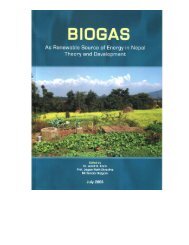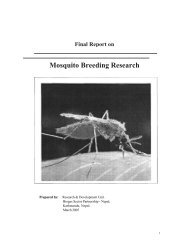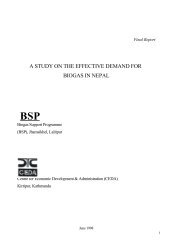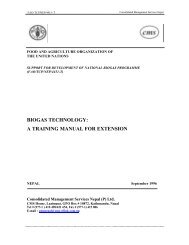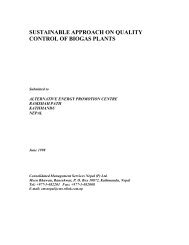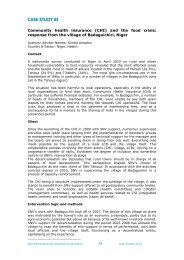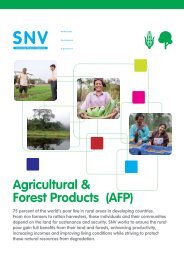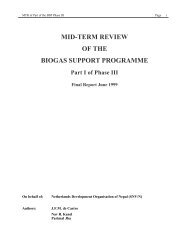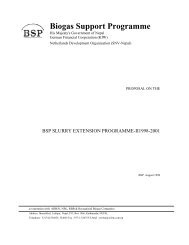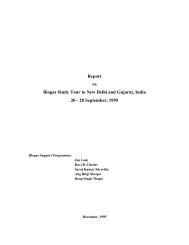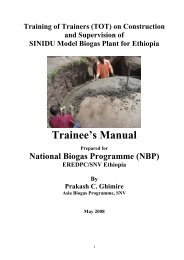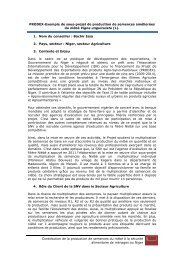Renewable energy perspective plan of nepal 200-2020 an ... - SNV
Renewable energy perspective plan of nepal 200-2020 an ... - SNV
Renewable energy perspective plan of nepal 200-2020 an ... - SNV
Create successful ePaper yourself
Turn your PDF publications into a flip-book with our unique Google optimized e-Paper software.
RETs. In line with the objective <strong>of</strong> the RET development, major policies for<br />
development are:<br />
a) Use <strong>of</strong> appropriate RET will be encouraged in health posts, health centers,<br />
educational institutions <strong>of</strong> rural areas where grid electricity is not available. In<br />
addition, hotels, resorts <strong>an</strong>d restaur<strong>an</strong>ts will also be encouraged to install<br />
appropriate RETs like solar PV, solar thermal <strong>energy</strong>, wind etc.<br />
b) RETs will be promoted <strong>an</strong>d encouraged to use to reduce increasing imports <strong>of</strong><br />
fossil fuels like kerosene, diesel, petrol etc. so that the foreign exch<strong>an</strong>ge c<strong>an</strong> be<br />
saved <strong>an</strong>d mobilized for other national development.<br />
c) Along with other awareness programme model <strong>energy</strong> villages will be established<br />
to demonstrate <strong>an</strong>d create awareness on sustainable use <strong>of</strong> local resources <strong>an</strong>d<br />
renewable <strong>energy</strong> technologies in rural mountains, hills <strong>an</strong>d Terai. Similarly. RET<br />
parks will be established in academic institutions, like Center for Energy<br />
Studies/Institute <strong>of</strong> Engineering, including <strong>energy</strong> efficient buildings to facilitate<br />
awareness programme, to support higher level engineering courses (Master <strong>an</strong>d<br />
Post Graduate diploma) <strong>an</strong>d research <strong>an</strong>d development activities.<br />
d) Research <strong>an</strong>d development with private sector involvement will be sought to bring<br />
the cost <strong>of</strong> RETs down. In order to motivate private sectors' investment in RETs.<br />
appropriate intellectual property right mech<strong>an</strong>ism will be developed.<br />
e) Participation <strong>of</strong> local <strong>an</strong>d international non-governmental org<strong>an</strong>izations will be<br />
sought in the field <strong>of</strong> research, development <strong>an</strong>d dissemination <strong>of</strong>-rural <strong>energy</strong><br />
technology specifically renewable <strong>energy</strong>.<br />
f) <strong>Renewable</strong> Energy technology dissemination will be based upon their commercial<br />
viability.<br />
g) Private sector will be motivated to establish microhydro electricity, turbine-mill<br />
<strong>an</strong>d improved ghutta to utilize potential <strong>of</strong> local water resource <strong>of</strong> smaller<br />
magnitude.<br />
h) Solar <strong>an</strong>d wind <strong>energy</strong> data will be collected <strong>an</strong>d system <strong>of</strong> acquiring <strong>an</strong>d<br />
continuous updating <strong>of</strong> these data will be institutionalized through the Department<br />
<strong>of</strong> Hydrology <strong>an</strong>d Meteorology. The AEPC will be made a nodal institution <strong>an</strong>d<br />
will be strengthened to process <strong>an</strong>d produce usable database available for the use<br />
<strong>of</strong> private sector , NGOs, <strong>an</strong>d academic institutions.<br />
i) Passive <strong>an</strong>d active use <strong>of</strong> solar <strong>an</strong>d wind <strong>energy</strong> as a new supply or substitute to<br />
imported petroleum fuel will be encouraged through adoptive research <strong>an</strong>d<br />
development <strong>an</strong>d commercialization <strong>of</strong> technology. Academic research institutes,<br />
as well as private sector will be mobilized for this purpose, (e.g. in case <strong>of</strong> biogas<br />
promotion, the Department <strong>of</strong> Agriculture, the Department <strong>of</strong> Livestock <strong>an</strong>d the<br />
Department <strong>of</strong> Health could take a lead role in using their established extension<br />
network for slurry utilization). Similarly , Department <strong>of</strong> Forest <strong>an</strong>d Department <strong>of</strong><br />
Health also could include ICS dissemination programme as their one <strong>of</strong> the<br />
import<strong>an</strong>t programmes.



